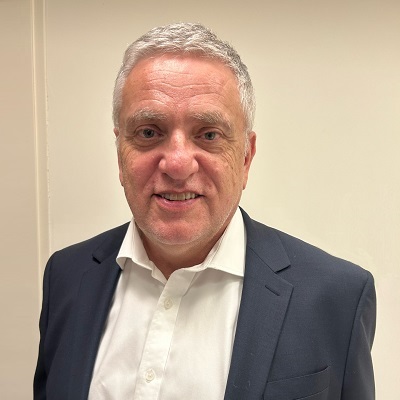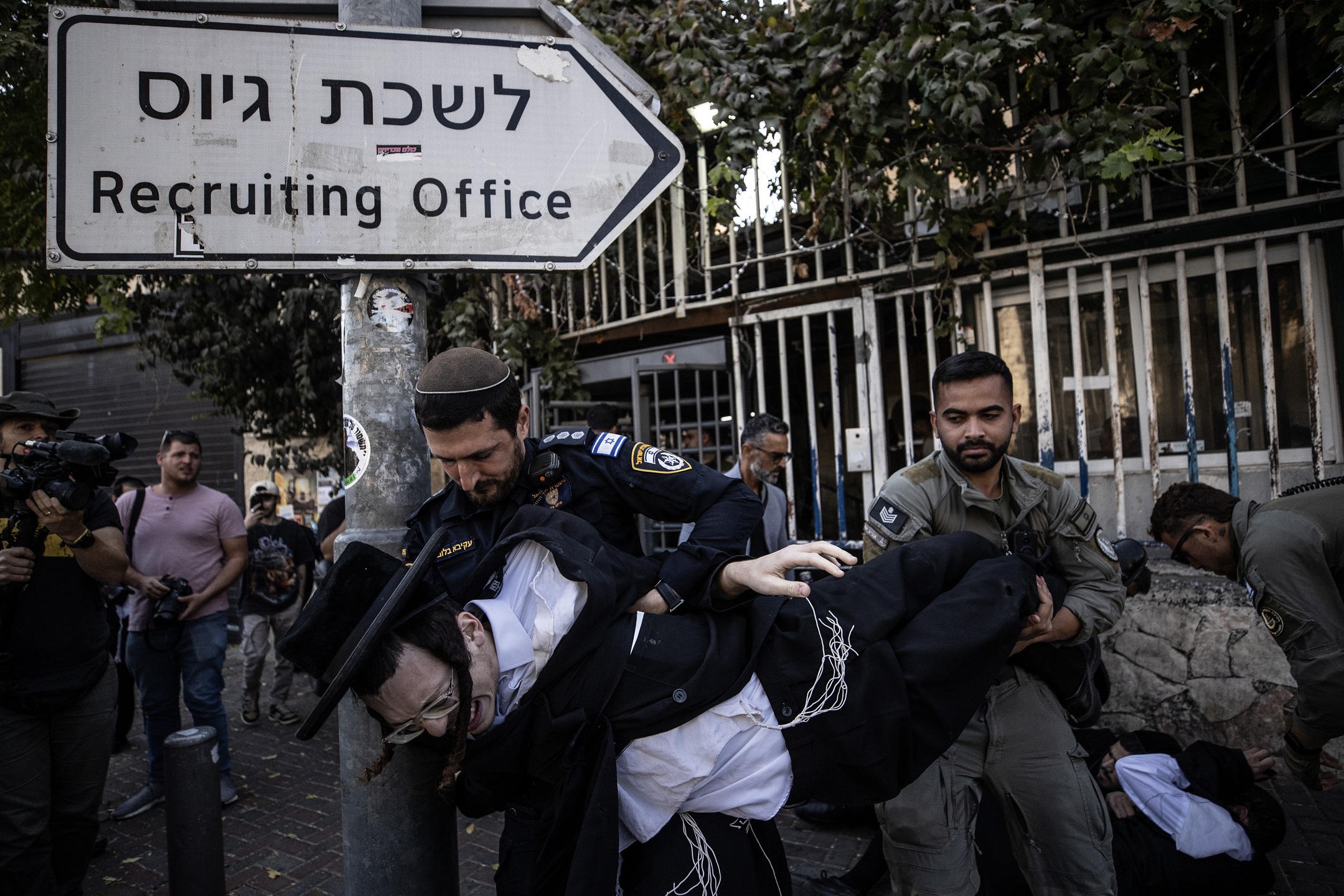Solving the Issue of Ultra-Orthodox Enlistment Is a National Imperative
The time has come to do away with the status quo, and Netanyahu needs to understand this if he wants to remain in power
When the current conflict between Israel and Iran and its proxies subsides, the primary focus in Israeli politics will shift to the issue of ultra-Orthodox enlistment in the military.
The conflict has exposed the dire need to increase enlistment, both to boost the number of combat divisions and to cover the losses of killed or wounded combat soldiers. The Israel Defense Forces has been adamant that the days of the ultra-Orthodox receiving a free pass from serving in the army must end, with IDF Chief of Staff Herzi Halevi, Defense Minister Yoav Gallant, and numerous other current and former generals expressing that stance.
The IDF currently enlists around 1,800 ultra-Orthodox soldiers a year. This year, it intends to enlist an additional 3,000. About 63,000 ultra-Orthodox young men are eligible to enlist in the military, but so far plans exist to enlist no more than 10,000.
Were it not for the intervention of Israel’s Supreme Court, which has consistently called for the introduction of mandatory enlistment requirements for the ultra-Orthodox, the government would simply bury the issue. Indeed, the ultra-Orthodox parties have been pursuing legislation to legally enshrine the community’s de facto exemption from military service.
Resolving this issue is essential to creating social cohesion. Much of Israeli society resents the ultra-Orthodox, who they perceive to be shirking the burden of fighting for the state’s survival.
The anger is palpable in conversation with those who watch the ultra-Orthodox enjoy the holiday break from their studies while their own loved ones are fighting in the military reserves. Many reservists are now on their third stint since the war broke out, having served for as many as 250 days this year. A disproportionate number of reservists in their 30s and 40s have been killed fighting in Lebanon, leaving behind families who will have to pick up the pieces.
The ultra-Orthodox rabbinic leadership has harbored deep-rooted mistrust and opposition toward army service. That opposition is largely based on the belief that serving in the army will compromise young practitioners’ adherence to their lifestyle and lead them away from religious observance. Some argue that the ultra-Orthodox community is already doing its part to protect the state since, they say, the study of Torah provides protection.
Under pressure from the Supreme Court, the IDF issued enlistment orders over the summer to 3,000 ultra-Orthodox men. The response was feeble, with only a few dozen complying. Meanwhile, more extreme ultra-Orthodox elements have held demonstrations against the enlistment orders, many of which turned extremely violent.
The question facing the nation is how to formulate a solution that will be acceptable to all the stakeholders.
It needs to be emphasized that the ultra-Orthodox communities are far from homogeneous. There are many sectors that do encourage or permit military service, and there are dedicated divisions in the IDF that accommodate the needs of ultra-Orthodox soldiers.
Give the gift of hope
We practice what we preach:
accurate, fearless journalism. But we can't do it alone.
- On the ground in Gaza, Syria, Israel, Egypt, Pakistan, and more
- Our program trained more than 100 journalists
- Calling out fake news and reporting real facts
- On the ground in Gaza, Syria, Israel, Egypt, Pakistan, and more
- Our program trained more than 100 journalists
- Calling out fake news and reporting real facts
Join us.
Support The Media Line. Save democracy.
There is also a significant element of the ultra-Orthodox community who are implacably opposed to the state and feel no obligation to serve its interests. They are willing to endure any hardships imposed by the government so as to avoid enlisting.
The ultra-Orthodox are also thought to be undergoing internal changes, with many ultra-Orthodox youth seeking to integrate into Israel society and improve their economic wellbeing. Military service would be an essential element in the integration that many young ultra-Orthodox Israelis seek. But if this trend is accurate, it would take at least a decade or two to materialize. Israel does not have the luxury of time.
Leaders in the ultra-Orthodox community have threatened to torpedo the coalition if the government refuses to pass a law maintaining the exemption from mandatory service. Former Sephardi Chief Rabbi Yitzhak Yosef went so far as to advocate in March that his followers buy tickets to leave Israel rather than enlist. In July, he instructed his followers to tear up their enlistment notices.
The opposition has called to end government funding to those institutions that refuse to allow their followers to enlist. Opposition leader Yair Lapid led that call together with Avigdor Lieberman and individuals from Prime Minister Benjamin Netanyahu’s ruling Likud Party.
In a betrayal of their own constituents, right-wing lawmakers Itamar Ben Gvir and Bezalel Smotrich have been relatively muted on the issue. It has taken more than a year for Smotrich to finally make a statement calling for the enlistment of the ultra-Orthodox. Too little, too late.
Many believe that ending government funding to ultra-Orthodox institutions will provide sufficient pressure to coerce some ultra-Orthodox communities to comply. But there is a countervailing view that the ultra-Orthodox will not bow to such measures. In April, Yedioth Ahronoth reported that ultra-Orthodox groups in Israel had raised $60 million from overseas supporters to prop up institutions from which government funding had been withdrawn.
It is now estimated that close to $200 million has been raised. Whether this support is sustainable and sufficient is another question.
Other lawmakers including Benny Gantz and Gideon Sa’ar have sought a dialogue with the ultra-Orthodox leadership to seek some form of accommodation that all can abide by.
Behind closed doors, negotiators acknowledge the reality that many ultra-Orthodox men of yeshiva age are not actually enrolled or actively studying Torah. Various compromises are being worked on that would call those men up to military service while allowing others to continue their studies.
Coming from a national religious Zionist background, I have harbored my own resentment of the nonparticipation of the ultra-Orthodox in the IDF.
I see no difference between the importance of studying in yeshivot for national religious youth, who do so alongside proudly carrying out IDF service, and for ultra-Orthodox youth, who refuse to perform any form of national service. That ultra-Orthodox yeshiva students devote a period of time to serving in the army or some other form of national service will not mean that the ultra-Orthodox yeshivas will empty out.
Last August, Yoav Gallant approved the establishment of seven ultra-Orthodox yeshivas in the Hesder program, a model that combines Torah study and military service. The ultra-Orthodox Chedvata Yeshiva is already up and running.
The obligation to study Torah is not something that Jews are required to do during a particular stage of their lives. It is an ongoing obligation that never ceases. Moreover, one needs to put into practice what one learns, and there is no higher expression of this than serving to protect one’s fellow Jews so that they can live in peace.
Civic duty and responsibility are fundamental to ensuring social cohesion, and no sector of society should be granted a blanket exemption. This pertains to Arab Israeli citizens, too. There is an understanding that not everyone is suited for combat, but if the same proportion of ultra-Orthodox young men serve as combat soldiers as do young men from mainstream society, it will address the manpower needs while spreading the burden across more sectors.
I’m glad to see that Jewish learning is thriving throughout the country. Inherent in the social contract is that every citizen who benefits from citizenship in this country must contribute as well.
It is my fervent hope that the government, the IDF, and the ultra-Orthodox leadership are able to arrive at a mutually acceptable compromise. But time is of the essence, and the government cannot continue to let this process drag out.
As much as I oppose coercive measures as a general rule, this is one time when a strong message needs to be sent to the ultra-Orthodox leadership. If they cannot employ wisdom and understanding to arrive at a compromise, then the funding spigot needs to be turned off.
Current polling shows Netanyahu riding high, presumably based on positive shifts in the direction of the war. Today’s society is focused on achieving a successful conclusion to the war along with the release of the hostages. But the day after, the country will begin to assess the damage done. The damage to lives and livelihoods will be evident. Those reservists who served valiantly for long periods will return to their homes and their jobs. Together with families who are mourning lost loved ones, they will demand fundamental reforms.
If he seeks to remain in politics, Netanyahu should heed the fate of Winston Churchill, who was an outstanding war leader but deemed unfit to lead the UK after the end of World War II. How Netanyahu manages the issue of ultra-Orthodox enlistment will be pivotal, because the status quo will not be tolerated.




